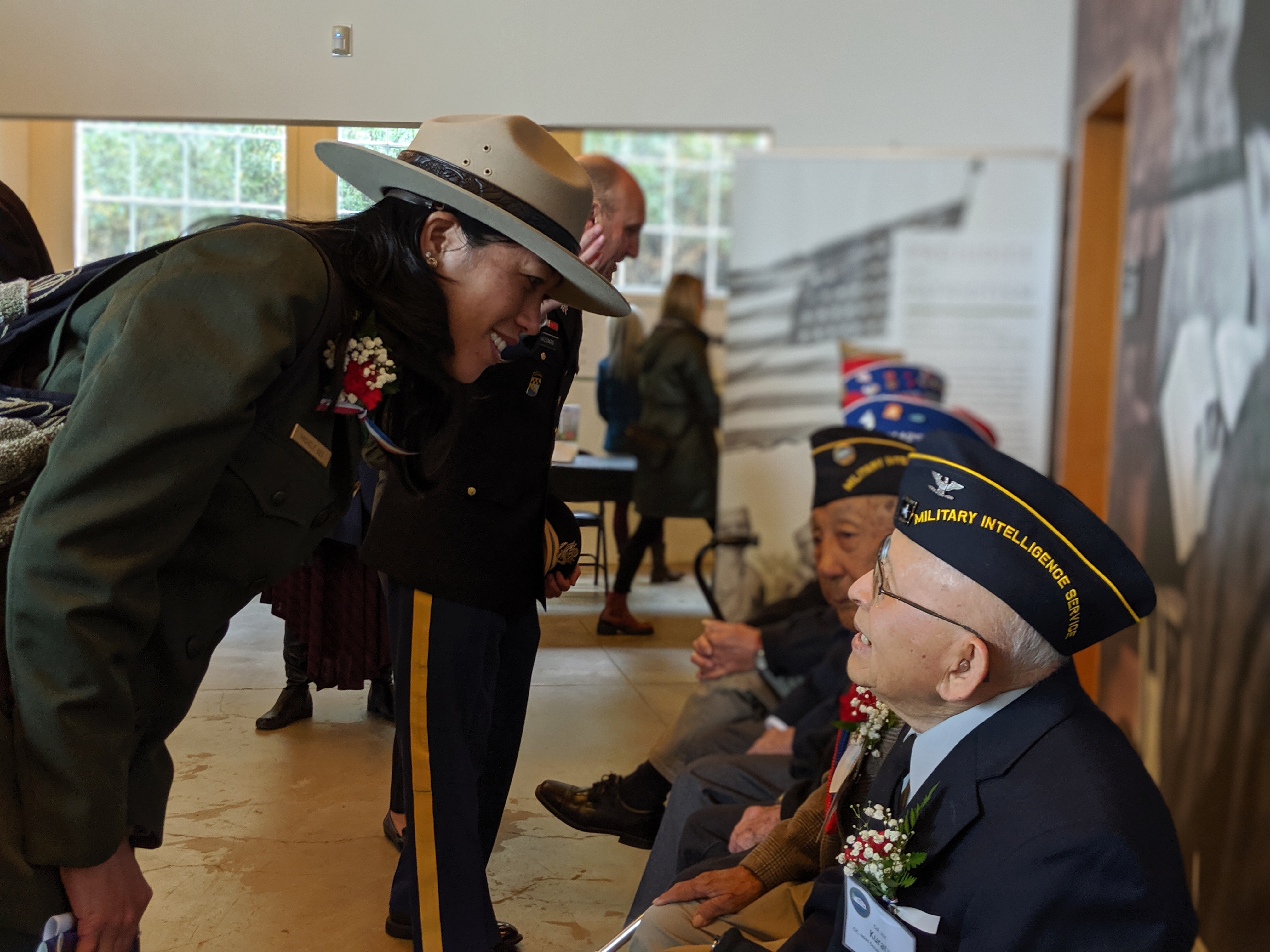Reflections on Veterans Day – November 11, 2024
By Naomi Shibata
Last week, in recognition of the goodwill shared between Japan and the United States, the Consul General of Japan of San Francisco hosted a reception attended by local U.S. military personnel who served in Japan. All branches were represented, and invitations were also extended to NJAHS Executive Director Rosalyn Tonai, Past President the Honorable Bryan Yagi, and President Derrek Tomine. I was invited to share a few stories of how Military Intelligence Service linguists of World War II helped lay the groundwork for an effective working relationship between the U.S. military and the people of Japan. Nine members of my extended family served in the U.S. Armed Forces during World War II. Five were Nikkei linguists.
The story begins one hundred years ago, at a time when first-generation Japanese immigrants, the Issei, were raising young families on the U.S. mainland. Many of the Issei parents were among the initial wave of immigrants who traveled to Hawaii. They labored first as plantation workers before making their way to the continental U.S.. Tough, resilient, and determined to start a new life in a new world, the Issei, along with most people of color, were denied the right to naturalized U.S. citizenship.
In the face of federally legislated racism, many Issei nonetheless instilled in their American-born children, the Nisei, a deep-rooted sense of duty and loyalty to the United States. Through their actions as much as their words, the Issei imparted lessons of commitment to country, community, and family. In the coming years, as the Nikkei (Japanese American) community struggled to survive the Great Depression, the winds of war began to blow eastward across the Pacific Ocean.
In 1941, U.S. military authorities, concerned over a lack of expertise in the Japanese language, authorized the Army and the Navy to independently operate Japanese language schools in the greater San Francisco Bay Area. The Army selected fifty-eight soldiers for its first class after interviewing more than 1,000 mainland Nikkei soldiers. Classes commenced on the San Francisco Presidio on November 1, 1941, and forty Nikkei and two Caucasian soldiers graduated six months later. Just over half of the graduates were deployed to Alaska and throughout the Pacific Theater. The remaining graduates were retained as instructors or assigned to General MacArthur’s staff in Australia.
Field commanders initially distrusted the Nikkei, giving them trivial assignments and keeping them away from the front lines. A Caucasian language school graduate advocated on behalf of his team, and the commander of U.S. forces on Guadalcanal gave them the benefit of a doubt. The Nikkei team performed with distinction and delivered high-value document translations, conducted skilled interrogations, and de-escalated volatile situations. The linguists served on the front lines, and they quickly earned the respect of their fellow soldiers and officers. The demand for their skills skyrocketed, and more than 6,000 linguists were eventually trained. General MacArthur’s Chief of Intelligence later reported that Nikkei linguists shortened the war in the Pacific by two years.
Nikkei linguists continued to deploy their unique skills at war’s end and throughout the post-war occupation of Japan. They repeatedly demonstrated how an understanding of language, culture, and world view could reveal options in otherwise seemingly dead-end situations. One powerful example was how linguists negotiated the surrenders of Japanese soldiers who, unaware that the war was over, took refuge in the jungles of the Philippines and the caves of Okinawa. Exhausted, hungry, confused, and armed, the soldiers were told the unthinkable – Japan lost the war. Yet the linguists convinced the soldiers that the time for fighting was past, and it was their duty to return home and help rebuild their country.
As quickly as Nikkei linguists were spun up as weapons of war, they were even more quickly repurposed as instruments of peace. 3,000 linguists helped to implement the monumental changes mandated during the post-war military occupation of Japan. Their work went beyond the dismantling of the wartime military machine and supporting war crimes trials. It broached far-reaching changes to political, social, economic, and educational systems. As the Japanese people watched the dismantling of old institutions and the introduction of new ones, the linguists served as a valuable conduit between the U.S. military and the Japanese citizenry.
One example was the decision to limit the number of kanji characters used in schools, newspapers, and government documents. Drawn from an estimated 50,000 available characters, the tōyō kanji list contained fewer than 2,000 characters and helped the U.S. military reach a broader audience. Some members of Japanese society regarded the decision to be a major blow against a pillar of Japanese culture, language. It was a bitter pill to swallow, and the linguists helped to ease the transition.
Time and time again, Nikkei linguists demonstrated how a substantive understanding of language and culture can influence decisions and relationships. On this Veteran’s Day in 2024, I honor not only those individuals who are here to accept my gratitude for their service, but also those who live on in my memory. I ask those who have served to share their stories with family and friends as well as the institutions they represent. I am grateful that Nikkei linguists, though often reluctant storytellers, chose to leave accounts of their lives for future generations to value and retell.
Naomi Shibata is an author, lecturer and writing workshop host. She is a contributing editor and docent for the National Japanese American Historical Society which operates the Military Intelligence Service Historic Learning Center in the Presidio of San Francisco. She also serves as a docent for the Friends and Family of Nisei Veterans which hosts an exhibit aboard the USS Hornet in Alameda, CA.
Kenneth@njahs.org





